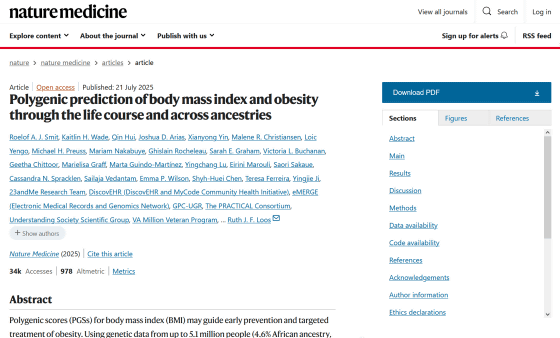A genetic test method will be developed that can predict whether a child's BMI will increase in the future

Obesity has become a global public health issue, with
Polygenic prediction of body mass index and obesity through the life course and across ancestries | Nature Medicine
https://www.nature.com/articles/s41591-025-03827-z

Genetic test predicts obesity in childhood – University of Copenhagen
https://cbmr.ku.dk/news/2025/genetic-test-predicts-obesity-in-childhood/
New Genetic Test Predicts Children With Future Risk of High BMI : ScienceAlert
https://www.sciencealert.com/new-genetic-test-predicts-children-with-future-risk-of-high-bmi
The genetic test developed by the research team is a method called ' polygenic score (PGS) ' that takes into account a large number of genes to calculate the risk of specific diseases and physical conditions. Thousands of genetic variants that increase the risk of obesity have already been identified, including 'gene variants that act in the brain and affect appetite.'
A research team of more than 600 researchers from approximately 500 institutions around the world used a database of genetic information from more than 5.1 million people to develop a polygenic score that can predict whether a person will have a high BMI in the future.

The researchers then tested how well their polygenic scores could predict future obesity risk using a dataset of physical and genetic traits from over 500,000 people, including genetic data and changes in BMI over time.
Testing showed that the new polygenic score was twice as effective at predicting future obesity risk as the best available testing method. A polygenic score based on genetic testing at age 5 explained 35% of the variation in BMI at age 18. The accuracy of the predictions varied across subject groups, with higher accuracy in people of European descent than in people of African descent.
Professor Ruth Roos of the University of Copenhagen and co-author of the paper commented, 'This new polygenic score represents a breakthrough in the genetic prediction of obesity risk, dramatically improving predictive accuracy. This brings us one step closer to a clinically useful genetic test.'

Another interesting finding was that people whose polygenic scores predicted a higher genetic predisposition to a higher BMI lost more weight in the first year of participating in the weight-loss program. Although these people were also more likely to regain weight later, the research team argues in their paper, 'Our results highlight that people with a higher genetic predisposition to obesity are more likely to respond to lifestyle changes. This contrasts with the determinist view that genetic predisposition is unalterable.'
'What makes this polygenic score so powerful is that it can predict the likelihood of adult obesity before a child is five years old, long before other early childhood risk factors start to affect weight,' said lead author Rolf Smit, assistant professor at the NNF Centre for Basic Metabolic Research at the University of Copenhagen. 'Intervening at this time could have a major impact.'
Related Posts:
in Science, Free Member, Posted by log1h_ik







